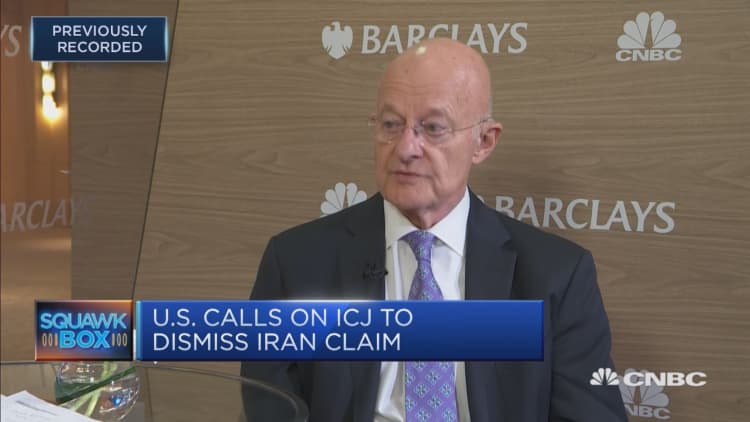
In order to see a Korean Peninsula free of nuclear weapons, the U.S. must ask North Korea about its long-term objective, warned James Clapper, former American director of national intelligence.
A retired U.S. Air Force lieutenant general, Clapper weighed in on the state of Washington-Pyongyang relations in the wake of the historic June summit between U.S. President Donald Trump and North Korean leader Kim Jong Un.
"What failed to happen in the summit that occurred here in Singapore would have been a great opportunity for President Trump to get the answer to a very important question: 'What is it that you require in North Korea that you don't need nuclear weapons to feel secure?'" Clapper told CNBC's Nancy Hungerford at the annual Barclays Asia Forum in Singapore.
"It would be very useful to know the answer to that. Otherwise, we're ad hoc-ing it and taking one step in the blind at a time," said Clapper, who was appointed by former President Barack Obama in 2010 and left the role when Trump entered office.
The U.S. leader is considering meeting Kim for a second summit "as soon as possible," according to recent news reports. But Clapper expressed doubt about the results of such talks.
"Based on my own interactions with the North Koreans, I'm very doubtful they're ever going to agree to denuclearization," he said, adding that Washington had yet to define what exactly denuclearization means.
While the American administration may define the concept as Pyongyang relinquishing all nuclear weapons, North Koreans "believe there are certain obligations that we incur to denuclearize the peninsula," such as no more U.S. bombers near North Korea, Clapper said.
Regarding the recent disappearance of prominent Saudi Arabian journalist Jamal Kashoggi, Clapper sounded a note of caution: "If the cause of the disappearance was, in fact, the Saudis and that comes out with compelling evidence, that could certainly be a setback for U.S.-Saudi relations, no question."
That bilateral alliance is seen as crucial to U.S. dealings with Tehran. On that subject, Clapper criticized the Trump administration for exiting the Iran nuclear deal.
"It's my belief that we basically squandered leverage we had over the Iranians, which we could have used to build on to get at other nefarious behavior. Moreover, backing out of the agreement really plays to the hardliner narrative within Iran," he said.
"The question I always pose to people is which would you rather have: state-sponsored terrorism with a nuclear weapons capability or state-sponsored terrorism without a nuclear weapons capability," he added.

